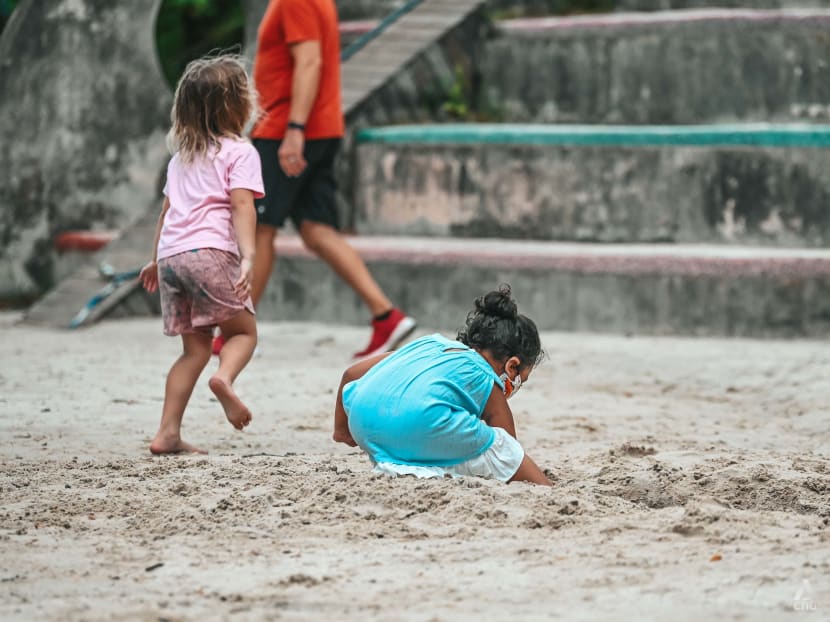COVID-19: Will approval be given for children under 12 to get the vaccine?

A child wearing a mask playing with sand at a playground. (Photo: Hanidah Amin)
SINGAPORE: With the surge in locally transmitted COVID-19 cases, it would be natural for parents to be anxious about vaccinating their young children.
Even as Singapore's vaccination rate exceeds 80 per cent of its population, half a million children under 12 years old remain ineligible for the jabs.
Last week, as Health Minister Ong Ye Kung confirmed that booster shots will be given to seniors and those who are immunocompromised, he said that vaccines for children under 12 are expected to start early next year after trials are completed and regulatory approval is given.
It’s taken nearly a year to give additional approval for the same vaccines given to adults to be administered to children.
Why is the approval for COVID-19 vaccines for kids taking longer and when are the trial results expected? Here’s what we know for now:
WHEN WILL TRIALS BE COMPLETED?
The first vaccine to be approved for children will likely be from Pfizer-BioNTech, as their trials are expected to be completed first.
A spokesperson from Pfizer and BioNTech said that data from 2,250 children between the ages of five and 11 years in its clinical trial is expected by the end of September. Emergency use authorisation will be sought from the US Food and Drug Administration (FDA) in October.
While it has expanded enrollment in its ongoing paediatric COVID-19 vaccine studies to another 2,250 children, this will not delay the anticipated data from the initial group of children.
“The proposed expansion will allow the companies to gather and evaluate additional safety and efficacy data on vaccination in younger populations,” Pfizer said in response to CNA queries. The full dataset from this study is expected by the end of this year.
Moderna did not respond to CNA's queries, but the US firm told US media in August that it expects to have enough data by the end of the year to seek authorisation for its vaccine for children between six and 11.
Currently, the Moderna vaccine is only authorised for use in adults aged 18 and above. The company filed for emergency use authorisation for teens aged 12 to 17 from the FDA in June.
The results of an early phase trial of the Sinovac vaccine in children and youth between the age of three to 17 has also been published.
WHAT HAPPENS THEN?
National University of Singapore (NUS) Associate Professor Hsu Li Yang said that if everything goes as planned, the US FDA will grant emergency use authorisation to the Pfizer-BioNTech vaccine for children under 12 before the end of this year.
As with previous rounds, Singapore’s Health Sciences Authority (HSA) could then have scope to grant approval for its use here.
The US authorised the Pfizer-BioNTech vaccine for emergency use in individuals 16 and older on Dec 11, 2020. HSA granted interim authorisation in Singapore several days after, on Dec 14.
The US expanded the authorisation on May 10 this year to include teens from 12 to 15 years old. HSA approved it on May 18 for a similar age group in Singapore.
HOW ARE VACCINES FOR CHILDREN DIFFERENT?
The doses are much smaller for children, said Professor Dale Fisher, senior consultant at the National University Hospital's (NUH) Division of Infectious Diseases.
The dose for children aged five to 11 is a third of the adult dose and for those younger than five, it is just one-tenth of the adult dose, he said. This is based on safety and efficacy findings in smaller early phase trials in this age group.
Clinical trial information published online shows that different dosages of 10mg to 30mg are being tested on different age groups for the Pfizer-BioNTech vaccine.
Currently, the trials extend to children as young as six months old. Data for children under five are expected after the trials for five to 11 year olds are submitted.
SHOULD ALL CHILDREN BE VACCINATED?
Professor Fisher said that it’s an “evolving situation”.
“Children rarely get severe disease but the risk is higher if they have underlying medical problems. Also the contribution children make to the amount of circulating virus is still not clear,” he said.
“We will learn a lot more about the value of vaccinating children from the data and from overseas over the next three to six months.”
Assoc Prof Hsu said that if HSA does approve COVID-19 vaccines for children, it will probably be best to include the vaccines in the National Childhood Immunisation Schedule, although that is more of a medium-term goal.
“If the vaccines prove to be as safe if not safer in children as compared to adults, then I will indeed recommend that children be vaccinated,” he said.
BOOKMARK THIS: Our comprehensive coverage of the COVID-19 pandemic and its developments
Download our app or subscribe to our Telegram channel for the latest updates on the coronavirus pandemic: https://cna.asia/telegram









